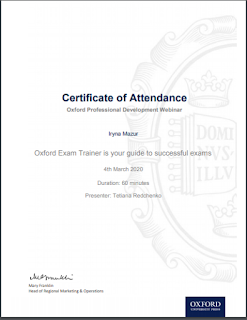If you didn’t make it to all of the sessions this year at ELTOC 2020, no worries! You can watch all the recordings on our YouTube channel!
Don't forget to download your resource pack for over 100 pages of professional development from our leading ELT experts!

Shaun Wilden: Mobile Learning
When I started teaching, if you wanted to use photos in class you would find and bring physical copies with you. These days I walk into class with around 7000 in my pocket, as do many of my students, since almost all carry a mobile device. This session will look at getting started with using mobile devices in class, using photos as a starting point for language practice and development.
Therese Hopfenbeck: Effective Feedback
Although there are strong claims in the literature that Assessment for Learning can enhance students’ learning, teachers still struggle to implement such practices in the classroom. In this talk, I will discuss the theory and practice of Assessment for Learning based on research studies and examples from the classroom.
Nick Michelioudakis: Mastering Phrasal Verbs
Few vocabulary areas cause students as many headaches as phrasal verbs. In this session we are going to look at the most common mistakes students make when studying these lexical items and we are going to look at some easy and practical ways of helping students remember them better and use them more confidently.
Philip Haines: Introduction to Global Skills
Global skills are essential to lifelong learning and success in the modern world. All English language teachers can develop global skills in their regular classes, whether these are part of the curriculum or not. In this session we will briefly defining what global skill are and then see how teachers can make simple adaptions to current practice to help develop global skills in their students.
Diana Lea: Helping Learners Build Core Vocabulary: Oxford Word Lists
Vocabulary acquisition is a key aspect of language learning, but not all words are equally important to know. Which vocabulary will be immediately useful to learners and help them to achieve their communicative aims at different points in the language learning journey?
The Oxford 3000 and Oxford 5000 are core word lists for secondary and adult learners of English from A1 to C1 level on the CEFR. They are designed to help learners, teachers and materials developers make informed choices about the words most worth focusing on.
This webinar will explore the value of word lists in language teaching and consider some key questions: how many words do learners need? Which words are the most useful to know? It will outline the development of the Oxford 3000 and 5000, based on the key principles of frequency and relevance to learners, and how the lists have been aligned to the CEFR. It will look at the application of the lists to learning materials and suggest some practical ways in which teachers and learners can exploit the lists for themselves in the classroom or for self-study.
Gordon Stobart: Assessing Global Skills
We encourage our students to develop global skills such as communication, critical thinking and creativity. The difficult questions are whether, and how, we assess them. If we need to assess them, then conventional assessments such as tests and marks are unlikely to be fit-for-purpose. In this presentation I explore some alternative assessment approaches.
Sarah Rogerson: Writing ELT Tests for Teenagers
In this talk, you will learn about the high-level principles of English language assessment for teenagers. We’ll explore how assessment bodies design tests aimed at teenagers and examine some of the challenges OUP have faced in designing the Oxford Test of English for Schools. Finally, we’ll look at some tips for the classroom that teachers can take away to improve the assessments that they provide for teenagers.
Nicky Hockly: Digital literacies in English Language Teaching
Digital literacies are the technical skills and social practices needed to effectively interact with digital technologies. They are key 21st century or ‘global’ skills. But what exactly are digital literacies, and how are they related to English language teaching? This talk looks at some of the theory underpinning digital literacies, and also outlines some practical activities for the language classroom.
| 










